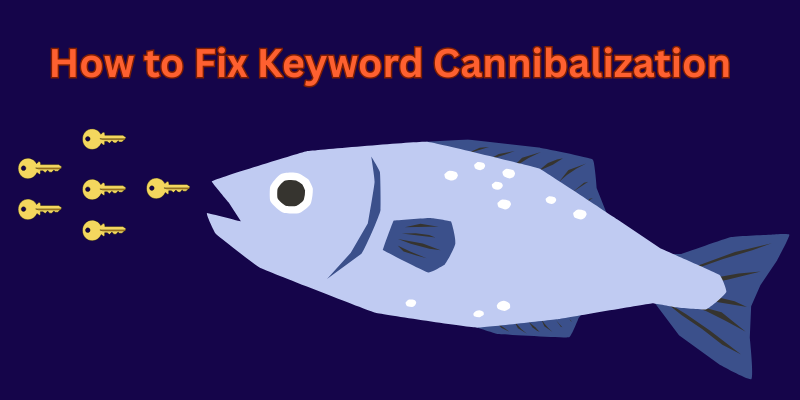What Is Keyword Cannibalization in SEO | SEO Guide 2025
Published: 08/May/2025
Keyword cannibalization happens when more than one page on your website targets the same keyword. Instead of helping, these pages compete with each other on search engines like Google. This makes it hard for Google to know which page to show. That’s why your rankings drop, and traffic gets lower.

Simple Example
Let’s say you run a food blog and have three posts using the keyword “best pizza in town.”
Google gets confused. It may show none of your posts on top. You end up losing clicks.
Why Keyword Cannibalization Hurts Your SEO
Here’s what happens when you have keyword cannibalization:
- You lose search traffic.
- Google shows the wrong page.
- You waste your SEO work.
- Clicks go to the wrong page.
- You confuse your visitors.
Keyword cannibalization in SEO is a silent problem, but it hurts big time if not fixed.
How Does Keyword Cannibalization Happen?
Here are some common reasons:
- Writing many articles on the same topic.
- Using the same keyword in your blog, homepage, and product pages.
- Not planning keywords before publishing.
- Copying and pasting similar content.
This is where a keyword cannibalization audit helps. It shows which pages fight each other.
How to Check Keyword Cannibalization (Step-by-Step)

You can find it manually or use SEO tools. Let’s look at both ways.
✅ Manual Check
- Go to Google and type:
site:yourdomain.com “your keyword”
Example:site:myblog.com “best SEO tips” - See how many pages show up.
- If you see more than one, you might have keyword cannibalization.
✅ Use Tools to Save Time
- SEMrush: It shows a keyword cannibalization report.
- Ahrefs: Their Keyword Cannibalization. The Ahrefs tool lets you compare ranking pages.
- Google Search Console: Under Performance, check if more than one URL ranks for the same keyword.
How to Fix Keyword Cannibalization

Fixing this issue is easier than you think.
1. Merge Similar Pages
Combine content from pages that use the same keyword.
Pick one page as the main page. Move the useful info from others into it.
2. Use Unique Keywords
Don’t use the same keyword everywhere.
For example, if you use “SEO keywords for restaurants” on one page, use “marketing tips for restaurants” on another.
3. Add 301 Redirects
If you delete a page, make sure to redirect it to the main one.
This way, your visitors and Google won’t get lost.
4. Refresh Meta Tags
Write new, unique titles and descriptions for each page.
5. Use Internal Links
Link smaller pages to the main page. This tells Google which one is most important.
Example for Restaurants: Why It Matters
Let’s say you own a restaurant website. You might write five blog posts using the same keyword:
“Best vegan dishes in Los Angeles.”
That’s a problem!
Instead:
- Use one post for that keyword.
- Use others like
- “Affordable vegan meals LA”
- “Top vegan restaurants downtown LA”
- “Quick vegan dishes for lunch”
This will improve your SEO and attract more people.
Do a Keyword Cannibalization Audit
Make this part of your monthly SEO work.
Here’s what to do:
| Task | How Often | Tool |
|---|---|---|
| Check top keywords | Monthly | Google Console |
| Look for keyword overlap | Monthly | Ahrefs |
| Update content and fix pages | Monthly | SEMrush |
| Plan new keywords before writing | Always | Google Sheets |
This regular keyword cannibalization audit can boost your site traffic.
Use Tools to Help You
Tools make life easier!
Here are the top ones to use:
📌 SEMrush
- Use Position Tracking
- Get a clear cannibalization SEO report
📌 Ahrefs
- Check if multiple pages rank for one keyword
- Use the Keyword Cannibalization Ahrefs feature
📌 Google Search Console
- Use the Performance tab
- Check keyword rankings by page
How to Avoid Keyword Cannibalization in the Future
Here are simple steps to prevent it:
- Plan ahead
Use a spreadsheet to assign one keyword per page. - Use long-tail keywords
Instead of “pizza,” try “gluten-free pizza for kids.” - Write unique content
Never copy topics across pages. - Audit your content
Check pages every month. - Use keyword research tools
Tools help you find fresh and unique terms.
Pro Tip: How to Buy Keywords the Smart Way
You can’t “buy” keywords directly, but you can target them with ads or create content around them.
If you’re in the food business, use platforms like
- Google Ads for paid keyword bidding.
- SEMrush to explore SEO keywords for restaurants.
Use low-competition keywords for quick wins!
Summary: Your Fix Checklist
✔ Find duplicate keywords
✔ Merge or change similar pages
✔ Redirect old URLs
✔ Update meta tags
✔ Plan fresh keywords
✔ Do monthly audits
Fixing keyword cannibalization SEO problems give you better rankings and happy users.
✅ FAQs
Q1: What is keyword cannibalization in SEO?
It means having many pages on your site using the same keyword, which means these pages compete with each other in Google searches.
Q2: Why is keyword cannibalization bad?
It confuses search engines and can lower your search ranking.
Q3: How do I check for keyword cannibalization?
Use tools like Ahrefs, SEMrush, or Google Search Console. You can also do a site search on Google.
Q4: Can I fix keyword cannibalization myself?
Yes! You can combine pages, change keywords, or update content.
Q5: How does cannibalization affect restaurant websites?
If many pages target “SEO keywords for restaurants,” it can hurt rankings. It’s better to use unique keywords for each page.
Q6: What is a keyword cannibalization audit?
It’s a checkup to find and fix keyword cannibalization issues across your website.
✅ Final Thought
If you’re targeting the same keyword on multiple pages, stop right now!
Take a few minutes to check your content.
Make smart updates using the tips above.
When every page has a clear purpose and unique keyword, your SEO will thank you.
Need help? Start with a simple key cannibalization check using free tools.
Your site will grow, and you’ll rank higher, without competing with yourself.
You may find these posts engaging!
- Best Keyword Research Tools for Small Businesses in 2025
- The Rise of Voice Search: What It Means for Digital Marketing





